PSY016 Report: Open-Mindedness Predicting Cognitive Reflection Test
VerifiedAdded on 2023/06/18
|12
|3181
|247
Report
AI Summary
This report investigates the effect of open-mindedness on critical thinking ability, utilizing Actively Open-Minded Thinking (AOT) to predict Cognitive Reflection Test (CRT) outcomes. The study, involving 305 psychology undergraduates, employs regression analysis to demonstrate a positive relationship between open-mindedness and CRT scores. The results indicate that changes in open-mindedness directly impact critical thinking abilities, leading to the acceptance of the alternative hypothesis. The research highlights the significance of open-mindedness in fostering effective decision-making and improved outcomes in the workplace. Quantitative data analysis using SPSS reveals a strong association between the variables, with open-mindedness identified as a highly predictive factor for critical thinking. The report concludes that cultivating open-mindedness is crucial for enhancing critical thinking skills and achieving better results.
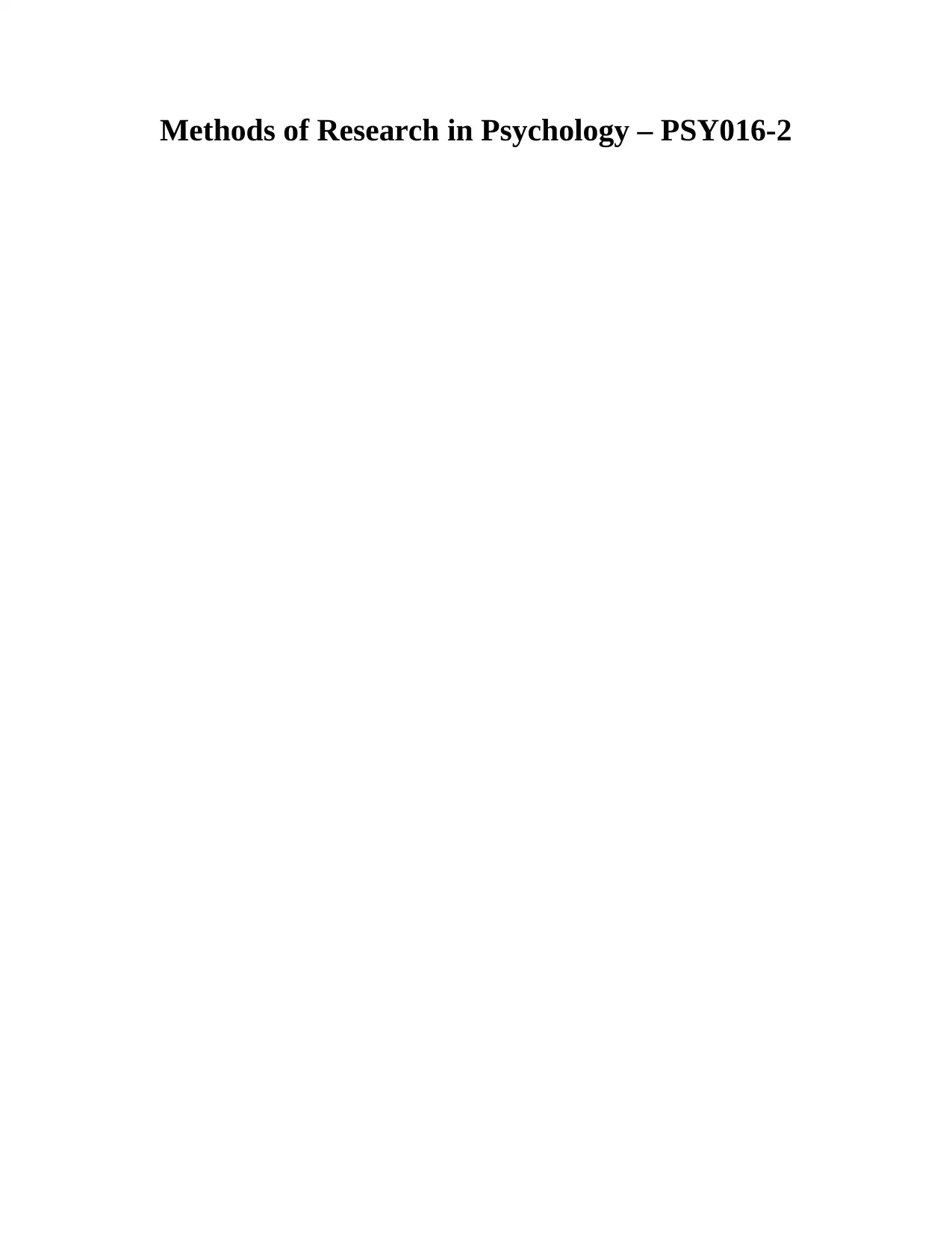
Methods of Research in Psychology – PSY016-2
Paraphrase This Document
Need a fresh take? Get an instant paraphrase of this document with our AI Paraphraser
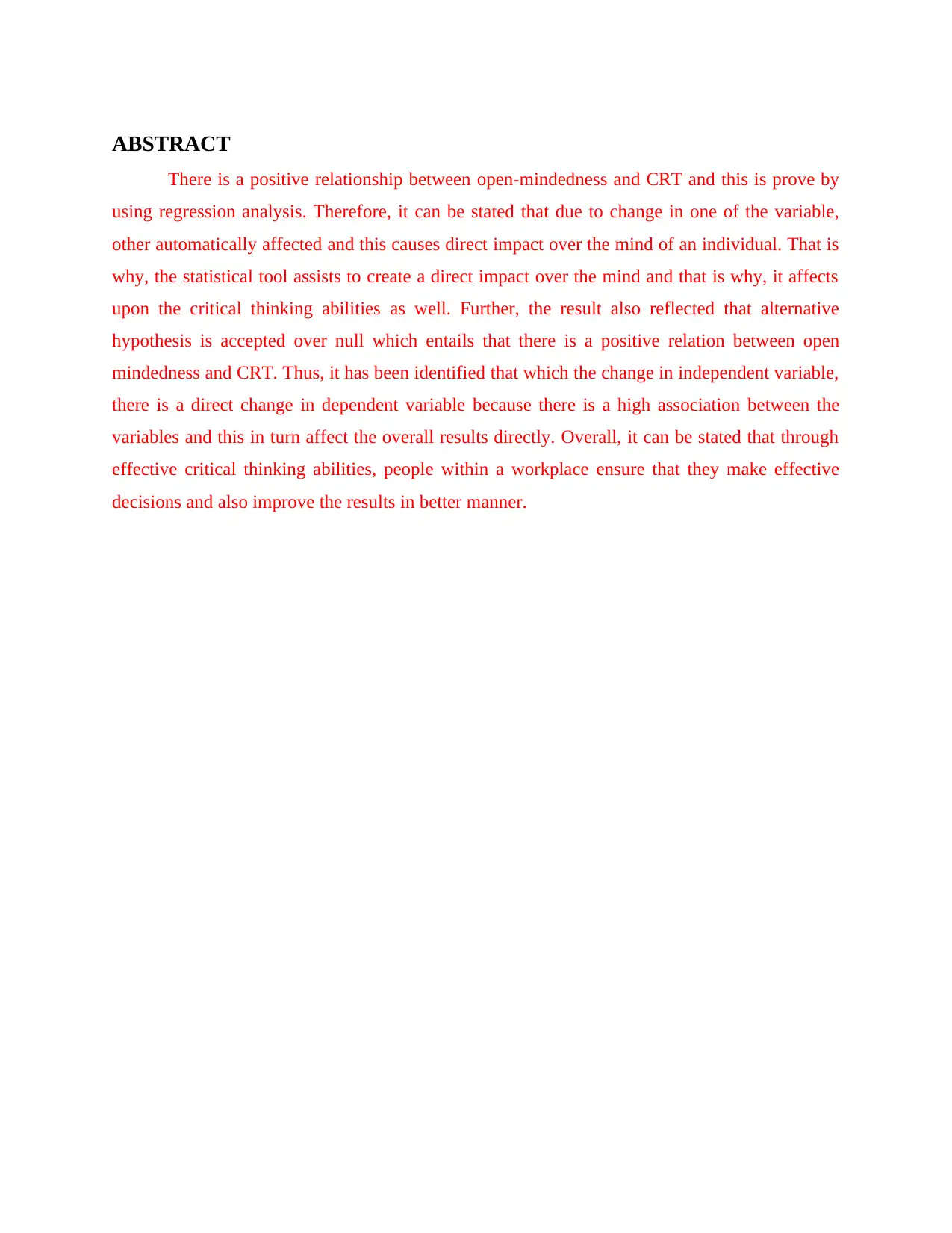
ABSTRACT
There is a positive relationship between open-mindedness and CRT and this is prove by
using regression analysis. Therefore, it can be stated that due to change in one of the variable,
other automatically affected and this causes direct impact over the mind of an individual. That is
why, the statistical tool assists to create a direct impact over the mind and that is why, it affects
upon the critical thinking abilities as well. Further, the result also reflected that alternative
hypothesis is accepted over null which entails that there is a positive relation between open
mindedness and CRT. Thus, it has been identified that which the change in independent variable,
there is a direct change in dependent variable because there is a high association between the
variables and this in turn affect the overall results directly. Overall, it can be stated that through
effective critical thinking abilities, people within a workplace ensure that they make effective
decisions and also improve the results in better manner.
There is a positive relationship between open-mindedness and CRT and this is prove by
using regression analysis. Therefore, it can be stated that due to change in one of the variable,
other automatically affected and this causes direct impact over the mind of an individual. That is
why, the statistical tool assists to create a direct impact over the mind and that is why, it affects
upon the critical thinking abilities as well. Further, the result also reflected that alternative
hypothesis is accepted over null which entails that there is a positive relation between open
mindedness and CRT. Thus, it has been identified that which the change in independent variable,
there is a direct change in dependent variable because there is a high association between the
variables and this in turn affect the overall results directly. Overall, it can be stated that through
effective critical thinking abilities, people within a workplace ensure that they make effective
decisions and also improve the results in better manner.
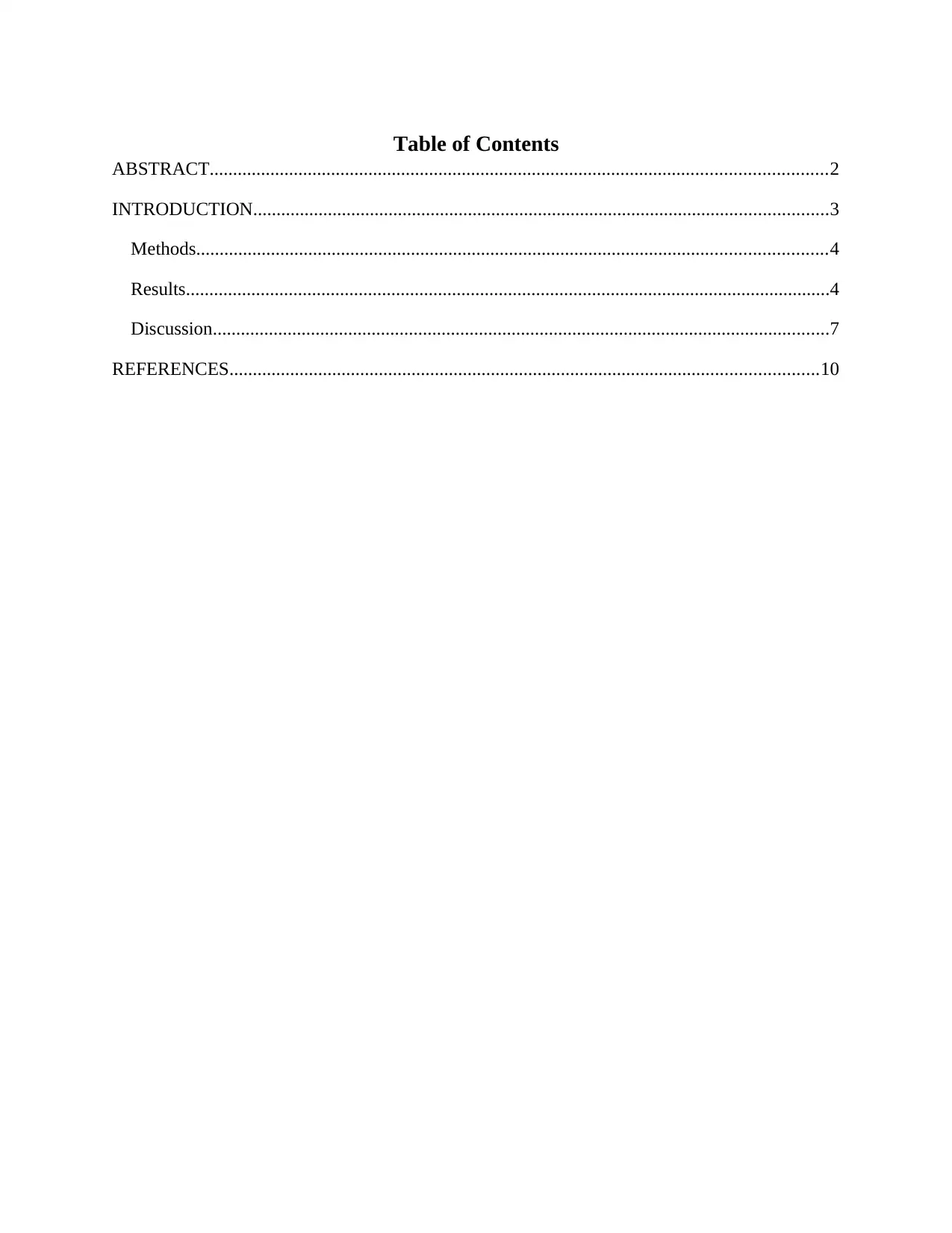
Table of Contents
ABSTRACT....................................................................................................................................2
INTRODUCTION...........................................................................................................................3
Methods.......................................................................................................................................4
Results..........................................................................................................................................4
Discussion....................................................................................................................................7
REFERENCES..............................................................................................................................10
ABSTRACT....................................................................................................................................2
INTRODUCTION...........................................................................................................................3
Methods.......................................................................................................................................4
Results..........................................................................................................................................4
Discussion....................................................................................................................................7
REFERENCES..............................................................................................................................10
⊘ This is a preview!⊘
Do you want full access?
Subscribe today to unlock all pages.

Trusted by 1+ million students worldwide
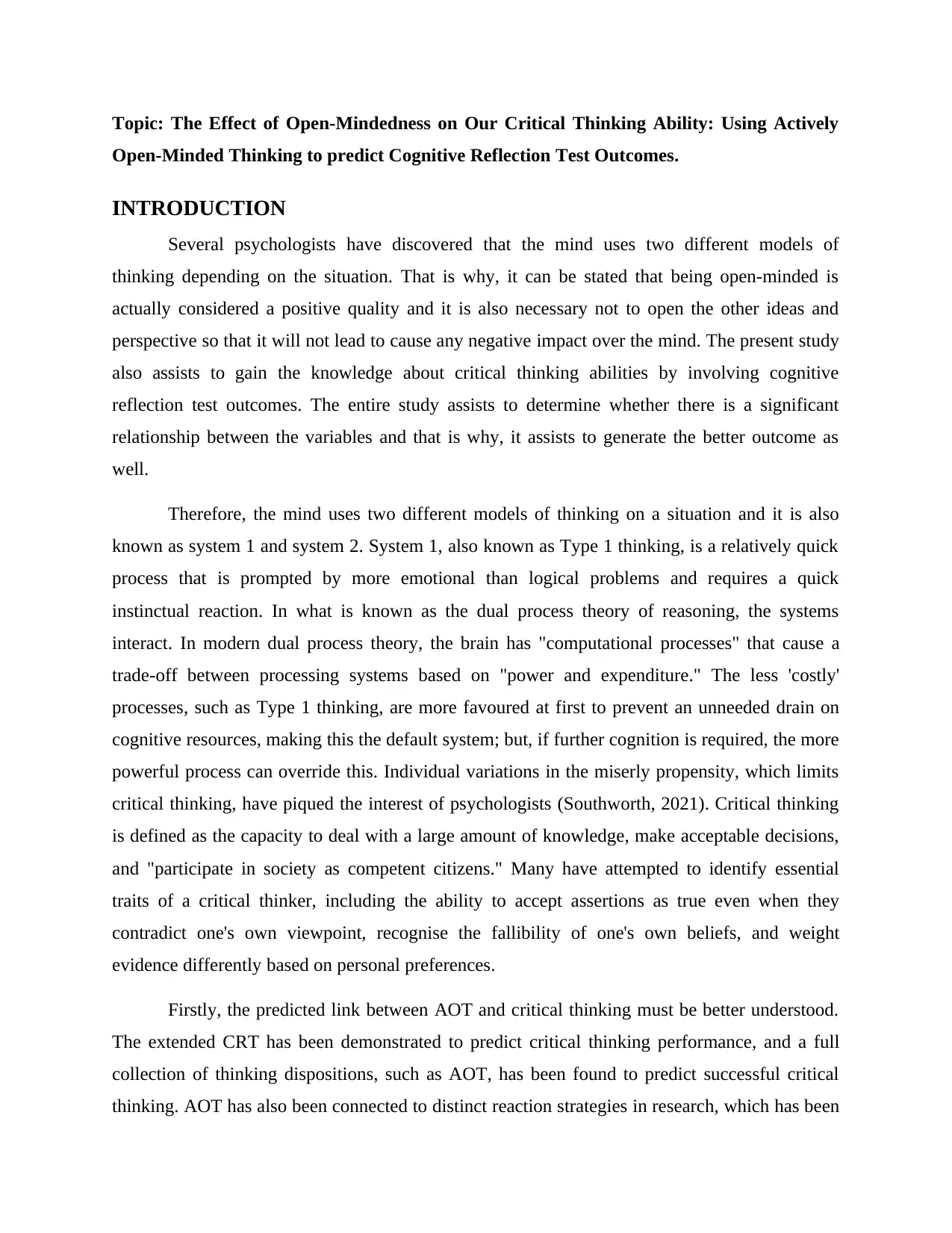
Topic: The Effect of Open-Mindedness on Our Critical Thinking Ability: Using Actively
Open-Minded Thinking to predict Cognitive Reflection Test Outcomes.
INTRODUCTION
Several psychologists have discovered that the mind uses two different models of
thinking depending on the situation. That is why, it can be stated that being open-minded is
actually considered a positive quality and it is also necessary not to open the other ideas and
perspective so that it will not lead to cause any negative impact over the mind. The present study
also assists to gain the knowledge about critical thinking abilities by involving cognitive
reflection test outcomes. The entire study assists to determine whether there is a significant
relationship between the variables and that is why, it assists to generate the better outcome as
well.
Therefore, the mind uses two different models of thinking on a situation and it is also
known as system 1 and system 2. System 1, also known as Type 1 thinking, is a relatively quick
process that is prompted by more emotional than logical problems and requires a quick
instinctual reaction. In what is known as the dual process theory of reasoning, the systems
interact. In modern dual process theory, the brain has "computational processes" that cause a
trade-off between processing systems based on "power and expenditure." The less 'costly'
processes, such as Type 1 thinking, are more favoured at first to prevent an unneeded drain on
cognitive resources, making this the default system; but, if further cognition is required, the more
powerful process can override this. Individual variations in the miserly propensity, which limits
critical thinking, have piqued the interest of psychologists (Southworth, 2021). Critical thinking
is defined as the capacity to deal with a large amount of knowledge, make acceptable decisions,
and "participate in society as competent citizens." Many have attempted to identify essential
traits of a critical thinker, including the ability to accept assertions as true even when they
contradict one's own viewpoint, recognise the fallibility of one's own beliefs, and weight
evidence differently based on personal preferences.
Firstly, the predicted link between AOT and critical thinking must be better understood.
The extended CRT has been demonstrated to predict critical thinking performance, and a full
collection of thinking dispositions, such as AOT, has been found to predict successful critical
thinking. AOT has also been connected to distinct reaction strategies in research, which has been
Open-Minded Thinking to predict Cognitive Reflection Test Outcomes.
INTRODUCTION
Several psychologists have discovered that the mind uses two different models of
thinking depending on the situation. That is why, it can be stated that being open-minded is
actually considered a positive quality and it is also necessary not to open the other ideas and
perspective so that it will not lead to cause any negative impact over the mind. The present study
also assists to gain the knowledge about critical thinking abilities by involving cognitive
reflection test outcomes. The entire study assists to determine whether there is a significant
relationship between the variables and that is why, it assists to generate the better outcome as
well.
Therefore, the mind uses two different models of thinking on a situation and it is also
known as system 1 and system 2. System 1, also known as Type 1 thinking, is a relatively quick
process that is prompted by more emotional than logical problems and requires a quick
instinctual reaction. In what is known as the dual process theory of reasoning, the systems
interact. In modern dual process theory, the brain has "computational processes" that cause a
trade-off between processing systems based on "power and expenditure." The less 'costly'
processes, such as Type 1 thinking, are more favoured at first to prevent an unneeded drain on
cognitive resources, making this the default system; but, if further cognition is required, the more
powerful process can override this. Individual variations in the miserly propensity, which limits
critical thinking, have piqued the interest of psychologists (Southworth, 2021). Critical thinking
is defined as the capacity to deal with a large amount of knowledge, make acceptable decisions,
and "participate in society as competent citizens." Many have attempted to identify essential
traits of a critical thinker, including the ability to accept assertions as true even when they
contradict one's own viewpoint, recognise the fallibility of one's own beliefs, and weight
evidence differently based on personal preferences.
Firstly, the predicted link between AOT and critical thinking must be better understood.
The extended CRT has been demonstrated to predict critical thinking performance, and a full
collection of thinking dispositions, such as AOT, has been found to predict successful critical
thinking. AOT has also been connected to distinct reaction strategies in research, which has been
Paraphrase This Document
Need a fresh take? Get an instant paraphrase of this document with our AI Paraphraser
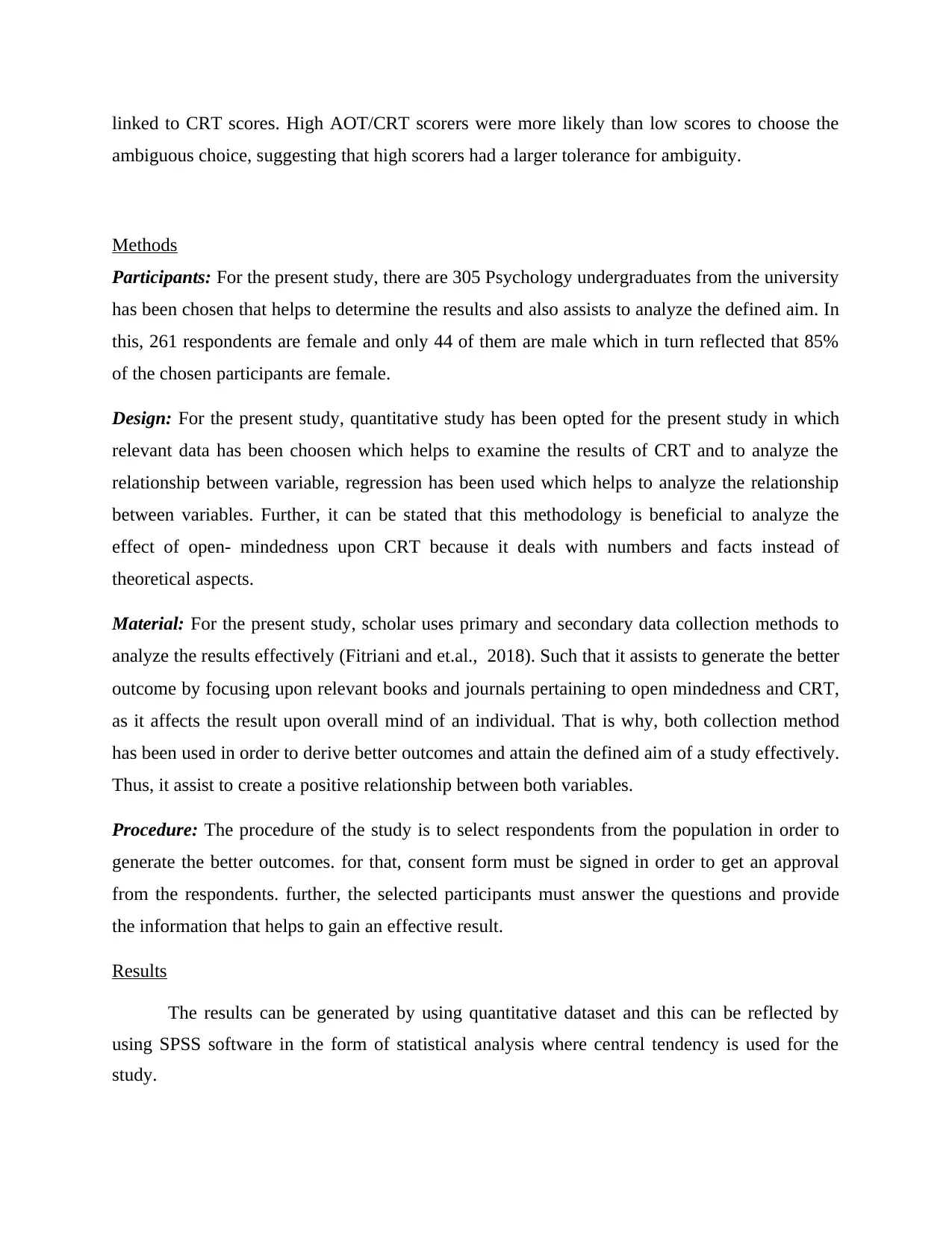
linked to CRT scores. High AOT/CRT scorers were more likely than low scores to choose the
ambiguous choice, suggesting that high scorers had a larger tolerance for ambiguity.
Methods
Participants: For the present study, there are 305 Psychology undergraduates from the university
has been chosen that helps to determine the results and also assists to analyze the defined aim. In
this, 261 respondents are female and only 44 of them are male which in turn reflected that 85%
of the chosen participants are female.
Design: For the present study, quantitative study has been opted for the present study in which
relevant data has been choosen which helps to examine the results of CRT and to analyze the
relationship between variable, regression has been used which helps to analyze the relationship
between variables. Further, it can be stated that this methodology is beneficial to analyze the
effect of open- mindedness upon CRT because it deals with numbers and facts instead of
theoretical aspects.
Material: For the present study, scholar uses primary and secondary data collection methods to
analyze the results effectively (Fitriani and et.al., 2018). Such that it assists to generate the better
outcome by focusing upon relevant books and journals pertaining to open mindedness and CRT,
as it affects the result upon overall mind of an individual. That is why, both collection method
has been used in order to derive better outcomes and attain the defined aim of a study effectively.
Thus, it assist to create a positive relationship between both variables.
Procedure: The procedure of the study is to select respondents from the population in order to
generate the better outcomes. for that, consent form must be signed in order to get an approval
from the respondents. further, the selected participants must answer the questions and provide
the information that helps to gain an effective result.
Results
The results can be generated by using quantitative dataset and this can be reflected by
using SPSS software in the form of statistical analysis where central tendency is used for the
study.
ambiguous choice, suggesting that high scorers had a larger tolerance for ambiguity.
Methods
Participants: For the present study, there are 305 Psychology undergraduates from the university
has been chosen that helps to determine the results and also assists to analyze the defined aim. In
this, 261 respondents are female and only 44 of them are male which in turn reflected that 85%
of the chosen participants are female.
Design: For the present study, quantitative study has been opted for the present study in which
relevant data has been choosen which helps to examine the results of CRT and to analyze the
relationship between variable, regression has been used which helps to analyze the relationship
between variables. Further, it can be stated that this methodology is beneficial to analyze the
effect of open- mindedness upon CRT because it deals with numbers and facts instead of
theoretical aspects.
Material: For the present study, scholar uses primary and secondary data collection methods to
analyze the results effectively (Fitriani and et.al., 2018). Such that it assists to generate the better
outcome by focusing upon relevant books and journals pertaining to open mindedness and CRT,
as it affects the result upon overall mind of an individual. That is why, both collection method
has been used in order to derive better outcomes and attain the defined aim of a study effectively.
Thus, it assist to create a positive relationship between both variables.
Procedure: The procedure of the study is to select respondents from the population in order to
generate the better outcomes. for that, consent form must be signed in order to get an approval
from the respondents. further, the selected participants must answer the questions and provide
the information that helps to gain an effective result.
Results
The results can be generated by using quantitative dataset and this can be reflected by
using SPSS software in the form of statistical analysis where central tendency is used for the
study.
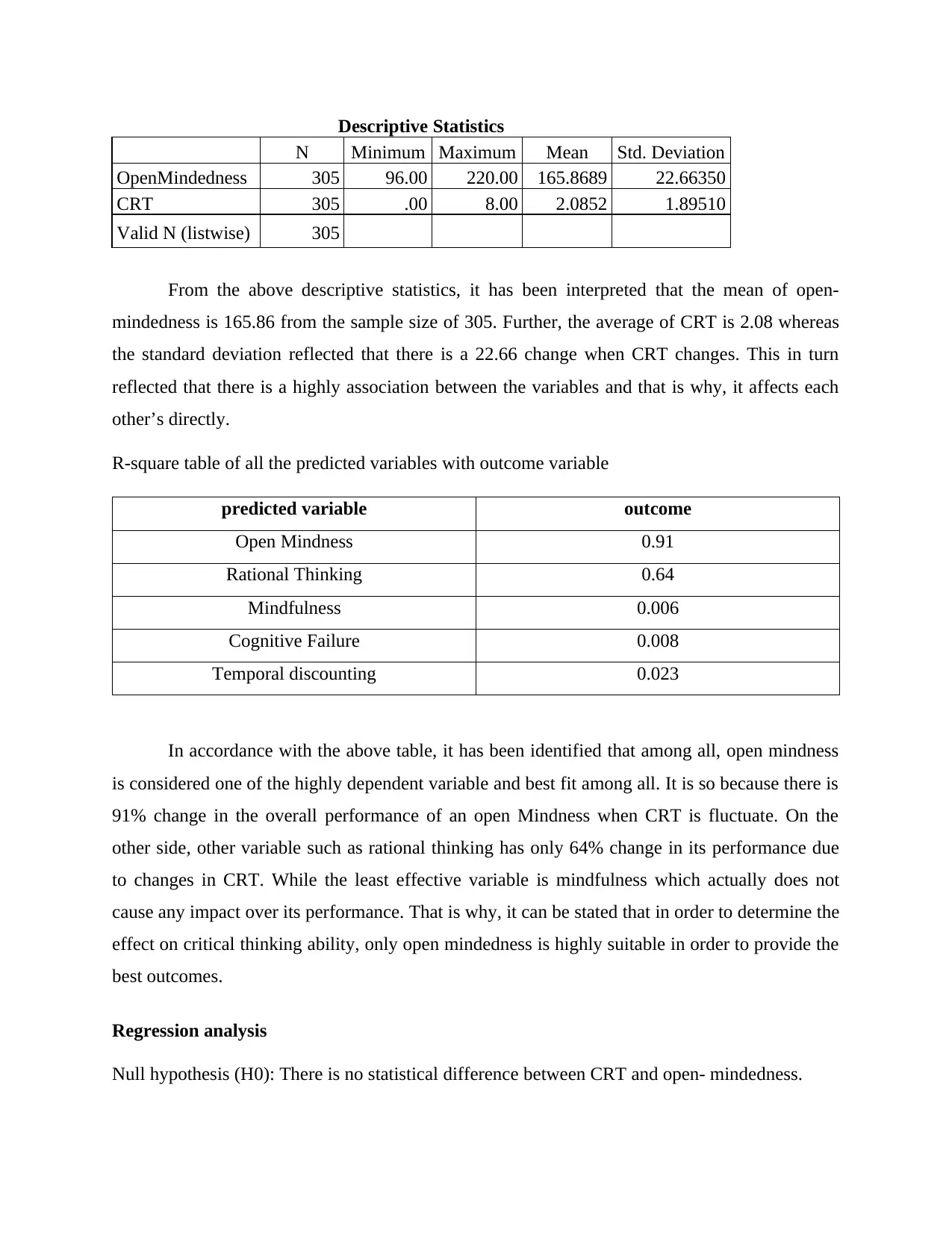
Descriptive Statistics
N Minimum Maximum Mean Std. Deviation
OpenMindedness 305 96.00 220.00 165.8689 22.66350
CRT 305 .00 8.00 2.0852 1.89510
Valid N (listwise) 305
From the above descriptive statistics, it has been interpreted that the mean of open-
mindedness is 165.86 from the sample size of 305. Further, the average of CRT is 2.08 whereas
the standard deviation reflected that there is a 22.66 change when CRT changes. This in turn
reflected that there is a highly association between the variables and that is why, it affects each
other’s directly.
R-square table of all the predicted variables with outcome variable
predicted variable outcome
Open Mindness 0.91
Rational Thinking 0.64
Mindfulness 0.006
Cognitive Failure 0.008
Temporal discounting 0.023
In accordance with the above table, it has been identified that among all, open mindness
is considered one of the highly dependent variable and best fit among all. It is so because there is
91% change in the overall performance of an open Mindness when CRT is fluctuate. On the
other side, other variable such as rational thinking has only 64% change in its performance due
to changes in CRT. While the least effective variable is mindfulness which actually does not
cause any impact over its performance. That is why, it can be stated that in order to determine the
effect on critical thinking ability, only open mindedness is highly suitable in order to provide the
best outcomes.
Regression analysis
Null hypothesis (H0): There is no statistical difference between CRT and open- mindedness.
N Minimum Maximum Mean Std. Deviation
OpenMindedness 305 96.00 220.00 165.8689 22.66350
CRT 305 .00 8.00 2.0852 1.89510
Valid N (listwise) 305
From the above descriptive statistics, it has been interpreted that the mean of open-
mindedness is 165.86 from the sample size of 305. Further, the average of CRT is 2.08 whereas
the standard deviation reflected that there is a 22.66 change when CRT changes. This in turn
reflected that there is a highly association between the variables and that is why, it affects each
other’s directly.
R-square table of all the predicted variables with outcome variable
predicted variable outcome
Open Mindness 0.91
Rational Thinking 0.64
Mindfulness 0.006
Cognitive Failure 0.008
Temporal discounting 0.023
In accordance with the above table, it has been identified that among all, open mindness
is considered one of the highly dependent variable and best fit among all. It is so because there is
91% change in the overall performance of an open Mindness when CRT is fluctuate. On the
other side, other variable such as rational thinking has only 64% change in its performance due
to changes in CRT. While the least effective variable is mindfulness which actually does not
cause any impact over its performance. That is why, it can be stated that in order to determine the
effect on critical thinking ability, only open mindedness is highly suitable in order to provide the
best outcomes.
Regression analysis
Null hypothesis (H0): There is no statistical difference between CRT and open- mindedness.
⊘ This is a preview!⊘
Do you want full access?
Subscribe today to unlock all pages.

Trusted by 1+ million students worldwide
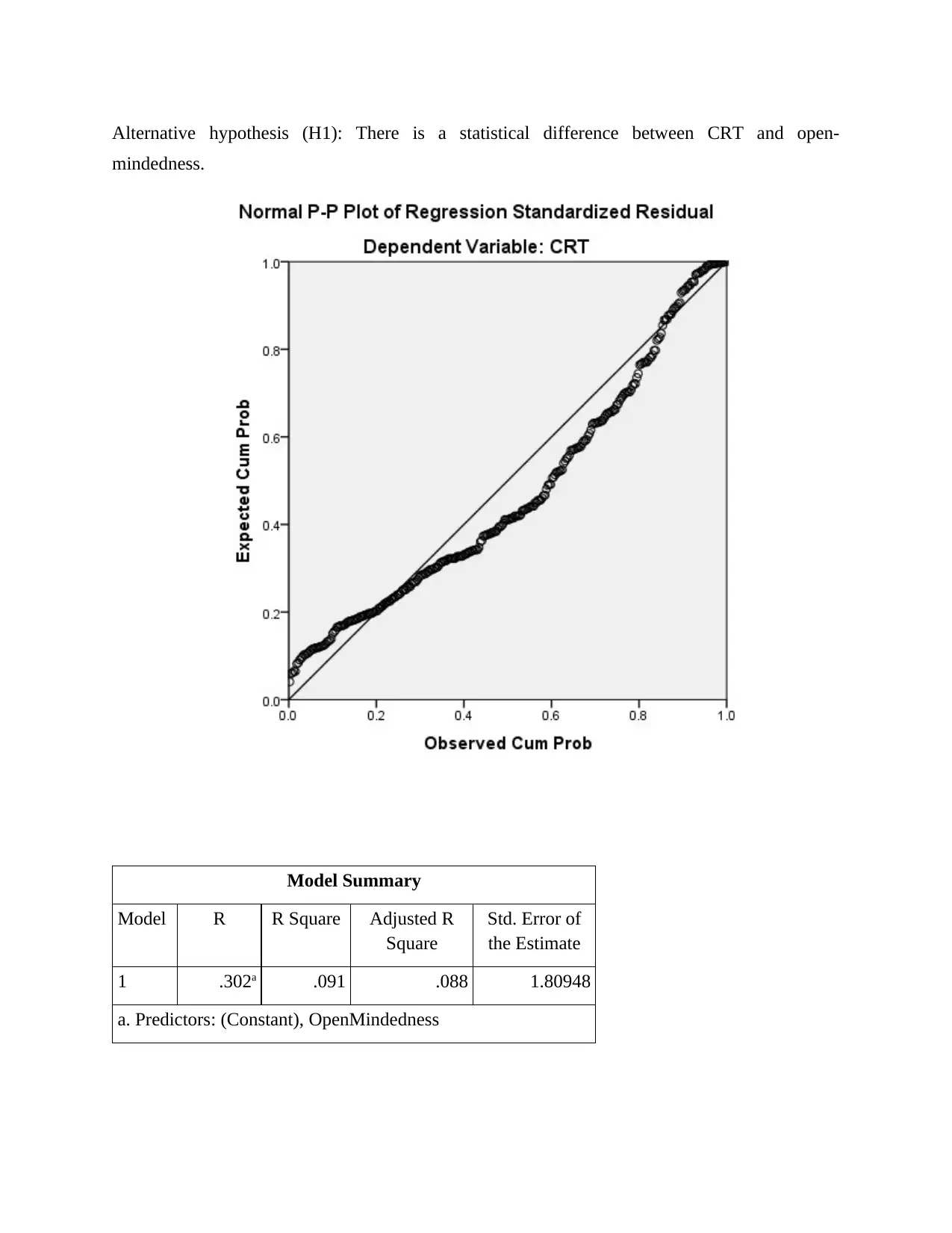
Alternative hypothesis (H1): There is a statistical difference between CRT and open-
mindedness.
Model Summary
Model R R Square Adjusted R
Square
Std. Error of
the Estimate
1 .302a .091 .088 1.80948
a. Predictors: (Constant), OpenMindedness
mindedness.
Model Summary
Model R R Square Adjusted R
Square
Std. Error of
the Estimate
1 .302a .091 .088 1.80948
a. Predictors: (Constant), OpenMindedness
Paraphrase This Document
Need a fresh take? Get an instant paraphrase of this document with our AI Paraphraser
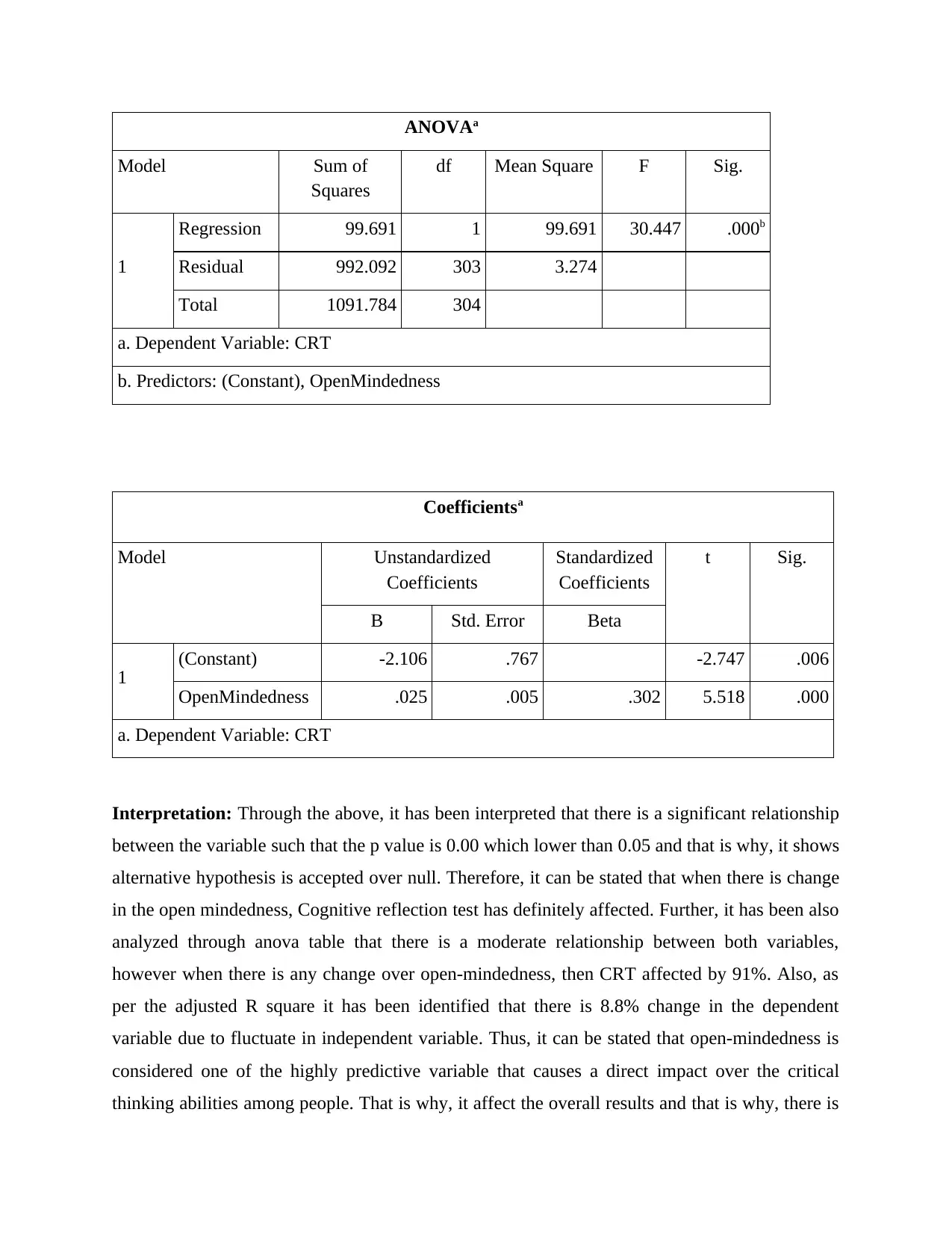
ANOVAa
Model Sum of
Squares
df Mean Square F Sig.
1
Regression 99.691 1 99.691 30.447 .000b
Residual 992.092 303 3.274
Total 1091.784 304
a. Dependent Variable: CRT
b. Predictors: (Constant), OpenMindedness
Coefficientsa
Model Unstandardized
Coefficients
Standardized
Coefficients
t Sig.
B Std. Error Beta
1
(Constant) -2.106 .767 -2.747 .006
OpenMindedness .025 .005 .302 5.518 .000
a. Dependent Variable: CRT
Interpretation: Through the above, it has been interpreted that there is a significant relationship
between the variable such that the p value is 0.00 which lower than 0.05 and that is why, it shows
alternative hypothesis is accepted over null. Therefore, it can be stated that when there is change
in the open mindedness, Cognitive reflection test has definitely affected. Further, it has been also
analyzed through anova table that there is a moderate relationship between both variables,
however when there is any change over open-mindedness, then CRT affected by 91%. Also, as
per the adjusted R square it has been identified that there is 8.8% change in the dependent
variable due to fluctuate in independent variable. Thus, it can be stated that open-mindedness is
considered one of the highly predictive variable that causes a direct impact over the critical
thinking abilities among people. That is why, it affect the overall results and that is why, there is
Model Sum of
Squares
df Mean Square F Sig.
1
Regression 99.691 1 99.691 30.447 .000b
Residual 992.092 303 3.274
Total 1091.784 304
a. Dependent Variable: CRT
b. Predictors: (Constant), OpenMindedness
Coefficientsa
Model Unstandardized
Coefficients
Standardized
Coefficients
t Sig.
B Std. Error Beta
1
(Constant) -2.106 .767 -2.747 .006
OpenMindedness .025 .005 .302 5.518 .000
a. Dependent Variable: CRT
Interpretation: Through the above, it has been interpreted that there is a significant relationship
between the variable such that the p value is 0.00 which lower than 0.05 and that is why, it shows
alternative hypothesis is accepted over null. Therefore, it can be stated that when there is change
in the open mindedness, Cognitive reflection test has definitely affected. Further, it has been also
analyzed through anova table that there is a moderate relationship between both variables,
however when there is any change over open-mindedness, then CRT affected by 91%. Also, as
per the adjusted R square it has been identified that there is 8.8% change in the dependent
variable due to fluctuate in independent variable. Thus, it can be stated that open-mindedness is
considered one of the highly predictive variable that causes a direct impact over the critical
thinking abilities among people. That is why, it affect the overall results and that is why, there is
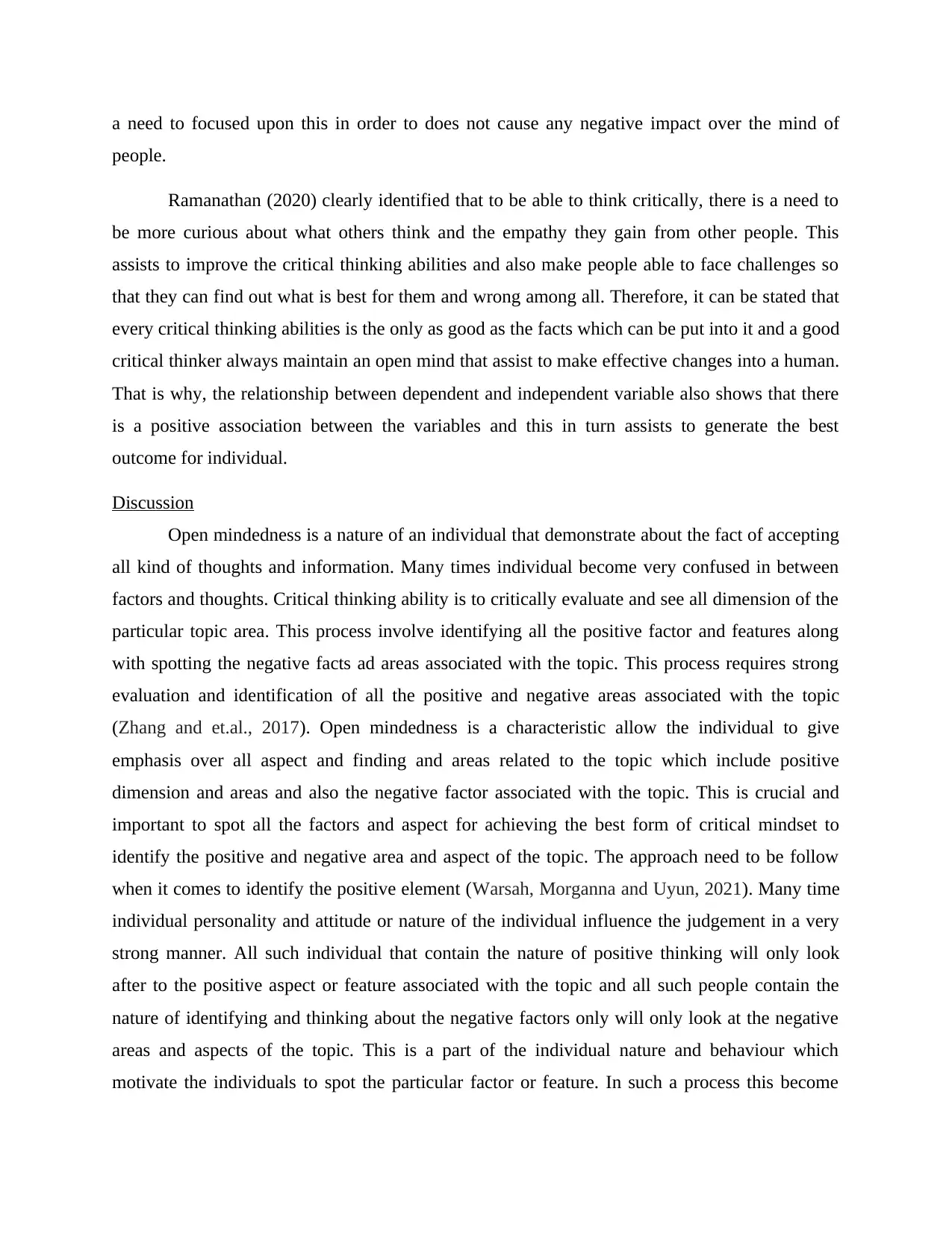
a need to focused upon this in order to does not cause any negative impact over the mind of
people.
Ramanathan (2020) clearly identified that to be able to think critically, there is a need to
be more curious about what others think and the empathy they gain from other people. This
assists to improve the critical thinking abilities and also make people able to face challenges so
that they can find out what is best for them and wrong among all. Therefore, it can be stated that
every critical thinking abilities is the only as good as the facts which can be put into it and a good
critical thinker always maintain an open mind that assist to make effective changes into a human.
That is why, the relationship between dependent and independent variable also shows that there
is a positive association between the variables and this in turn assists to generate the best
outcome for individual.
Discussion
Open mindedness is a nature of an individual that demonstrate about the fact of accepting
all kind of thoughts and information. Many times individual become very confused in between
factors and thoughts. Critical thinking ability is to critically evaluate and see all dimension of the
particular topic area. This process involve identifying all the positive factor and features along
with spotting the negative facts ad areas associated with the topic. This process requires strong
evaluation and identification of all the positive and negative areas associated with the topic
(Zhang and et.al., 2017). Open mindedness is a characteristic allow the individual to give
emphasis over all aspect and finding and areas related to the topic which include positive
dimension and areas and also the negative factor associated with the topic. This is crucial and
important to spot all the factors and aspect for achieving the best form of critical mindset to
identify the positive and negative area and aspect of the topic. The approach need to be follow
when it comes to identify the positive element (Warsah, Morganna and Uyun, 2021). Many time
individual personality and attitude or nature of the individual influence the judgement in a very
strong manner. All such individual that contain the nature of positive thinking will only look
after to the positive aspect or feature associated with the topic and all such people contain the
nature of identifying and thinking about the negative factors only will only look at the negative
areas and aspects of the topic. This is a part of the individual nature and behaviour which
motivate the individuals to spot the particular factor or feature. In such a process this become
people.
Ramanathan (2020) clearly identified that to be able to think critically, there is a need to
be more curious about what others think and the empathy they gain from other people. This
assists to improve the critical thinking abilities and also make people able to face challenges so
that they can find out what is best for them and wrong among all. Therefore, it can be stated that
every critical thinking abilities is the only as good as the facts which can be put into it and a good
critical thinker always maintain an open mind that assist to make effective changes into a human.
That is why, the relationship between dependent and independent variable also shows that there
is a positive association between the variables and this in turn assists to generate the best
outcome for individual.
Discussion
Open mindedness is a nature of an individual that demonstrate about the fact of accepting
all kind of thoughts and information. Many times individual become very confused in between
factors and thoughts. Critical thinking ability is to critically evaluate and see all dimension of the
particular topic area. This process involve identifying all the positive factor and features along
with spotting the negative facts ad areas associated with the topic. This process requires strong
evaluation and identification of all the positive and negative areas associated with the topic
(Zhang and et.al., 2017). Open mindedness is a characteristic allow the individual to give
emphasis over all aspect and finding and areas related to the topic which include positive
dimension and areas and also the negative factor associated with the topic. This is crucial and
important to spot all the factors and aspect for achieving the best form of critical mindset to
identify the positive and negative area and aspect of the topic. The approach need to be follow
when it comes to identify the positive element (Warsah, Morganna and Uyun, 2021). Many time
individual personality and attitude or nature of the individual influence the judgement in a very
strong manner. All such individual that contain the nature of positive thinking will only look
after to the positive aspect or feature associated with the topic and all such people contain the
nature of identifying and thinking about the negative factors only will only look at the negative
areas and aspects of the topic. This is a part of the individual nature and behaviour which
motivate the individuals to spot the particular factor or feature. In such a process this become
⊘ This is a preview!⊘
Do you want full access?
Subscribe today to unlock all pages.

Trusted by 1+ million students worldwide
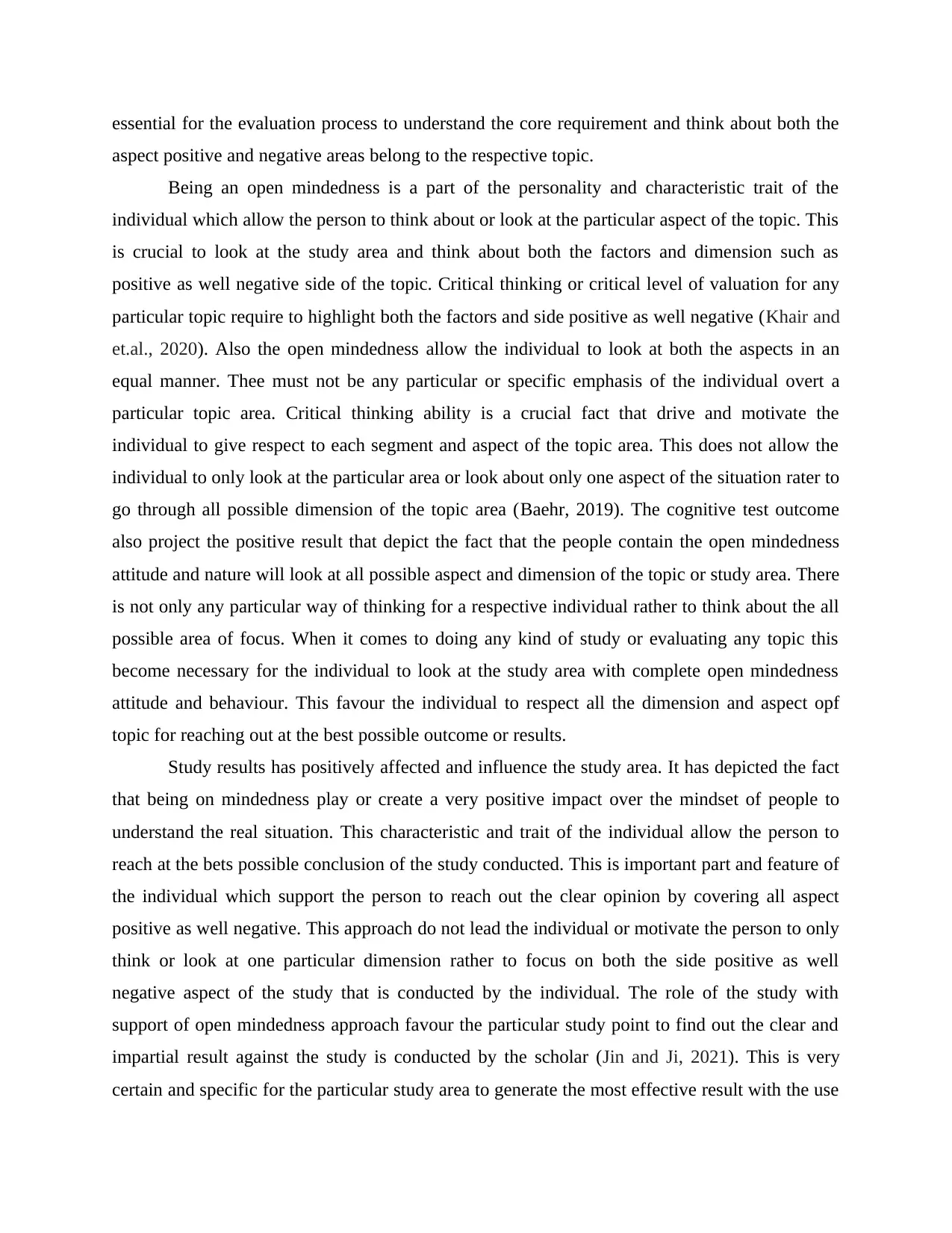
essential for the evaluation process to understand the core requirement and think about both the
aspect positive and negative areas belong to the respective topic.
Being an open mindedness is a part of the personality and characteristic trait of the
individual which allow the person to think about or look at the particular aspect of the topic. This
is crucial to look at the study area and think about both the factors and dimension such as
positive as well negative side of the topic. Critical thinking or critical level of valuation for any
particular topic require to highlight both the factors and side positive as well negative (Khair and
et.al., 2020). Also the open mindedness allow the individual to look at both the aspects in an
equal manner. Thee must not be any particular or specific emphasis of the individual overt a
particular topic area. Critical thinking ability is a crucial fact that drive and motivate the
individual to give respect to each segment and aspect of the topic area. This does not allow the
individual to only look at the particular area or look about only one aspect of the situation rater to
go through all possible dimension of the topic area (Baehr, 2019). The cognitive test outcome
also project the positive result that depict the fact that the people contain the open mindedness
attitude and nature will look at all possible aspect and dimension of the topic or study area. There
is not only any particular way of thinking for a respective individual rather to think about the all
possible area of focus. When it comes to doing any kind of study or evaluating any topic this
become necessary for the individual to look at the study area with complete open mindedness
attitude and behaviour. This favour the individual to respect all the dimension and aspect opf
topic for reaching out at the best possible outcome or results.
Study results has positively affected and influence the study area. It has depicted the fact
that being on mindedness play or create a very positive impact over the mindset of people to
understand the real situation. This characteristic and trait of the individual allow the person to
reach at the bets possible conclusion of the study conducted. This is important part and feature of
the individual which support the person to reach out the clear opinion by covering all aspect
positive as well negative. This approach do not lead the individual or motivate the person to only
think or look at one particular dimension rather to focus on both the side positive as well
negative aspect of the study that is conducted by the individual. The role of the study with
support of open mindedness approach favour the particular study point to find out the clear and
impartial result against the study is conducted by the scholar (Jin and Ji, 2021). This is very
certain and specific for the particular study area to generate the most effective result with the use
aspect positive and negative areas belong to the respective topic.
Being an open mindedness is a part of the personality and characteristic trait of the
individual which allow the person to think about or look at the particular aspect of the topic. This
is crucial to look at the study area and think about both the factors and dimension such as
positive as well negative side of the topic. Critical thinking or critical level of valuation for any
particular topic require to highlight both the factors and side positive as well negative (Khair and
et.al., 2020). Also the open mindedness allow the individual to look at both the aspects in an
equal manner. Thee must not be any particular or specific emphasis of the individual overt a
particular topic area. Critical thinking ability is a crucial fact that drive and motivate the
individual to give respect to each segment and aspect of the topic area. This does not allow the
individual to only look at the particular area or look about only one aspect of the situation rater to
go through all possible dimension of the topic area (Baehr, 2019). The cognitive test outcome
also project the positive result that depict the fact that the people contain the open mindedness
attitude and nature will look at all possible aspect and dimension of the topic or study area. There
is not only any particular way of thinking for a respective individual rather to think about the all
possible area of focus. When it comes to doing any kind of study or evaluating any topic this
become necessary for the individual to look at the study area with complete open mindedness
attitude and behaviour. This favour the individual to respect all the dimension and aspect opf
topic for reaching out at the best possible outcome or results.
Study results has positively affected and influence the study area. It has depicted the fact
that being on mindedness play or create a very positive impact over the mindset of people to
understand the real situation. This characteristic and trait of the individual allow the person to
reach at the bets possible conclusion of the study conducted. This is important part and feature of
the individual which support the person to reach out the clear opinion by covering all aspect
positive as well negative. This approach do not lead the individual or motivate the person to only
think or look at one particular dimension rather to focus on both the side positive as well
negative aspect of the study that is conducted by the individual. The role of the study with
support of open mindedness approach favour the particular study point to find out the clear and
impartial result against the study is conducted by the scholar (Jin and Ji, 2021). This is very
certain and specific for the particular study area to generate the most effective result with the use
Paraphrase This Document
Need a fresh take? Get an instant paraphrase of this document with our AI Paraphraser
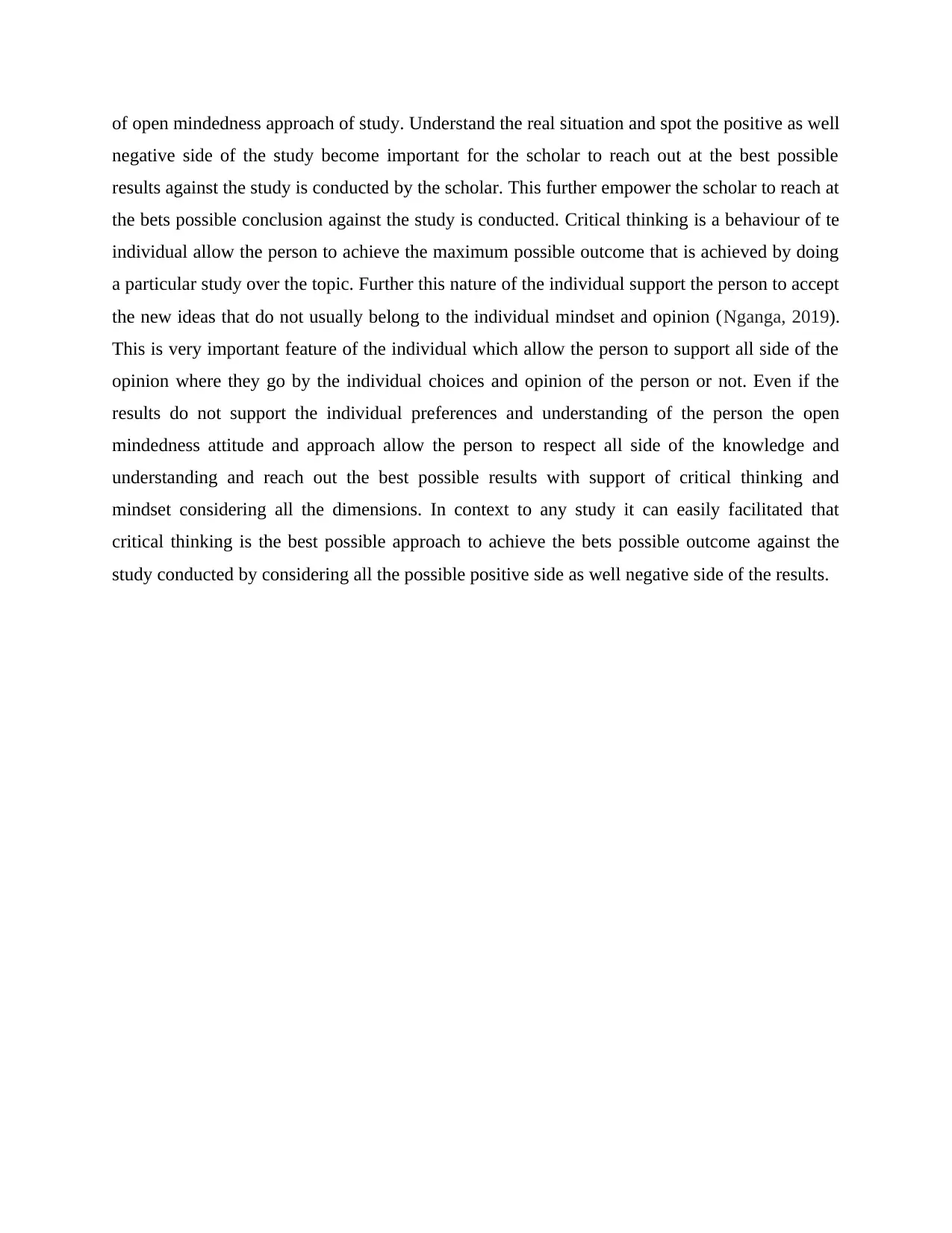
of open mindedness approach of study. Understand the real situation and spot the positive as well
negative side of the study become important for the scholar to reach out at the best possible
results against the study is conducted by the scholar. This further empower the scholar to reach at
the bets possible conclusion against the study is conducted. Critical thinking is a behaviour of te
individual allow the person to achieve the maximum possible outcome that is achieved by doing
a particular study over the topic. Further this nature of the individual support the person to accept
the new ideas that do not usually belong to the individual mindset and opinion (Nganga, 2019).
This is very important feature of the individual which allow the person to support all side of the
opinion where they go by the individual choices and opinion of the person or not. Even if the
results do not support the individual preferences and understanding of the person the open
mindedness attitude and approach allow the person to respect all side of the knowledge and
understanding and reach out the best possible results with support of critical thinking and
mindset considering all the dimensions. In context to any study it can easily facilitated that
critical thinking is the best possible approach to achieve the bets possible outcome against the
study conducted by considering all the possible positive side as well negative side of the results.
negative side of the study become important for the scholar to reach out at the best possible
results against the study is conducted by the scholar. This further empower the scholar to reach at
the bets possible conclusion against the study is conducted. Critical thinking is a behaviour of te
individual allow the person to achieve the maximum possible outcome that is achieved by doing
a particular study over the topic. Further this nature of the individual support the person to accept
the new ideas that do not usually belong to the individual mindset and opinion (Nganga, 2019).
This is very important feature of the individual which allow the person to support all side of the
opinion where they go by the individual choices and opinion of the person or not. Even if the
results do not support the individual preferences and understanding of the person the open
mindedness attitude and approach allow the person to respect all side of the knowledge and
understanding and reach out the best possible results with support of critical thinking and
mindset considering all the dimensions. In context to any study it can easily facilitated that
critical thinking is the best possible approach to achieve the bets possible outcome against the
study conducted by considering all the possible positive side as well negative side of the results.
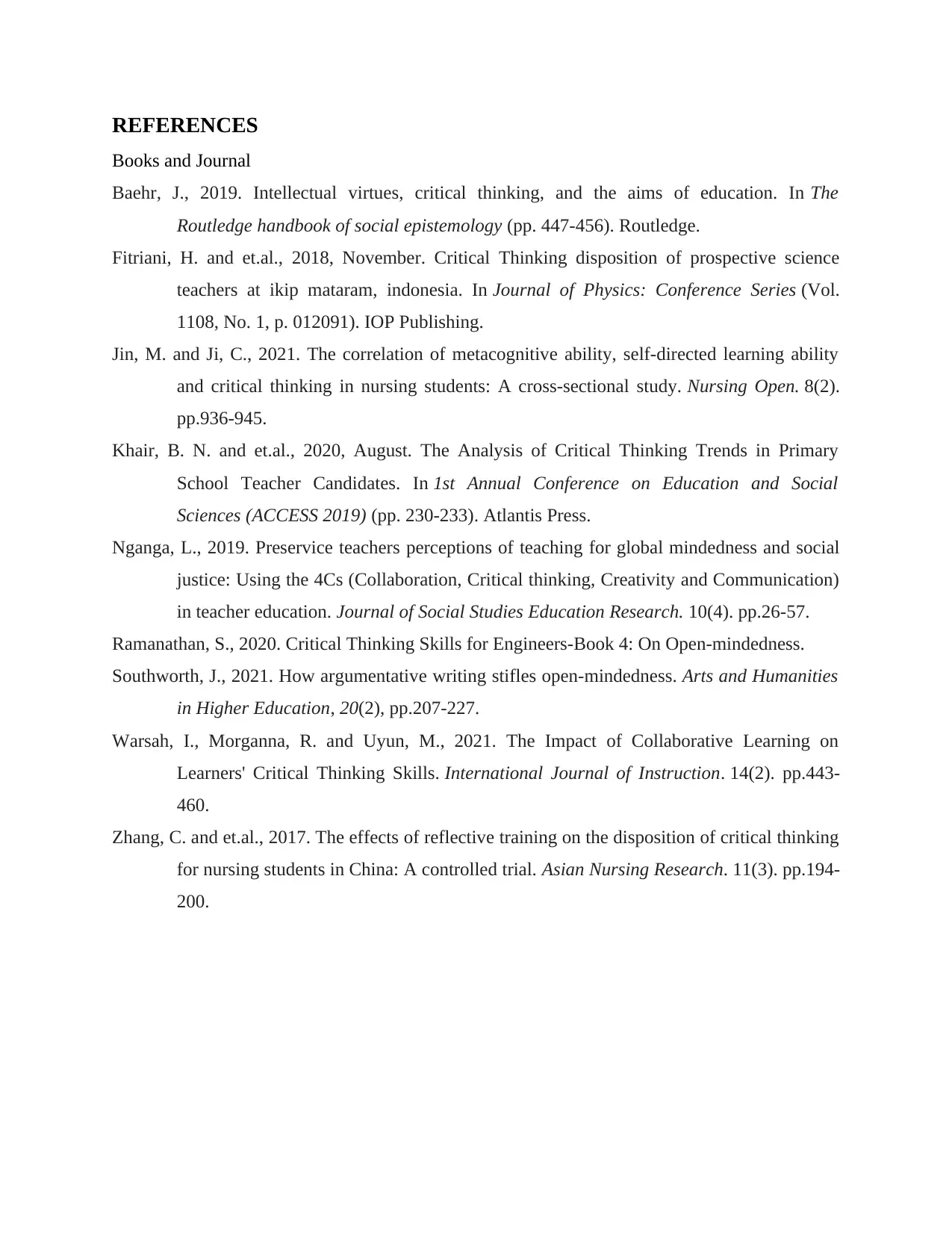
REFERENCES
Books and Journal
Baehr, J., 2019. Intellectual virtues, critical thinking, and the aims of education. In The
Routledge handbook of social epistemology (pp. 447-456). Routledge.
Fitriani, H. and et.al., 2018, November. Critical Thinking disposition of prospective science
teachers at ikip mataram, indonesia. In Journal of Physics: Conference Series (Vol.
1108, No. 1, p. 012091). IOP Publishing.
Jin, M. and Ji, C., 2021. The correlation of metacognitive ability, self‐directed learning ability
and critical thinking in nursing students: A cross‐sectional study. Nursing Open. 8(2).
pp.936-945.
Khair, B. N. and et.al., 2020, August. The Analysis of Critical Thinking Trends in Primary
School Teacher Candidates. In 1st Annual Conference on Education and Social
Sciences (ACCESS 2019) (pp. 230-233). Atlantis Press.
Nganga, L., 2019. Preservice teachers perceptions of teaching for global mindedness and social
justice: Using the 4Cs (Collaboration, Critical thinking, Creativity and Communication)
in teacher education. Journal of Social Studies Education Research. 10(4). pp.26-57.
Ramanathan, S., 2020. Critical Thinking Skills for Engineers-Book 4: On Open-mindedness.
Southworth, J., 2021. How argumentative writing stifles open-mindedness. Arts and Humanities
in Higher Education, 20(2), pp.207-227.
Warsah, I., Morganna, R. and Uyun, M., 2021. The Impact of Collaborative Learning on
Learners' Critical Thinking Skills. International Journal of Instruction. 14(2). pp.443-
460.
Zhang, C. and et.al., 2017. The effects of reflective training on the disposition of critical thinking
for nursing students in China: A controlled trial. Asian Nursing Research. 11(3). pp.194-
200.
Books and Journal
Baehr, J., 2019. Intellectual virtues, critical thinking, and the aims of education. In The
Routledge handbook of social epistemology (pp. 447-456). Routledge.
Fitriani, H. and et.al., 2018, November. Critical Thinking disposition of prospective science
teachers at ikip mataram, indonesia. In Journal of Physics: Conference Series (Vol.
1108, No. 1, p. 012091). IOP Publishing.
Jin, M. and Ji, C., 2021. The correlation of metacognitive ability, self‐directed learning ability
and critical thinking in nursing students: A cross‐sectional study. Nursing Open. 8(2).
pp.936-945.
Khair, B. N. and et.al., 2020, August. The Analysis of Critical Thinking Trends in Primary
School Teacher Candidates. In 1st Annual Conference on Education and Social
Sciences (ACCESS 2019) (pp. 230-233). Atlantis Press.
Nganga, L., 2019. Preservice teachers perceptions of teaching for global mindedness and social
justice: Using the 4Cs (Collaboration, Critical thinking, Creativity and Communication)
in teacher education. Journal of Social Studies Education Research. 10(4). pp.26-57.
Ramanathan, S., 2020. Critical Thinking Skills for Engineers-Book 4: On Open-mindedness.
Southworth, J., 2021. How argumentative writing stifles open-mindedness. Arts and Humanities
in Higher Education, 20(2), pp.207-227.
Warsah, I., Morganna, R. and Uyun, M., 2021. The Impact of Collaborative Learning on
Learners' Critical Thinking Skills. International Journal of Instruction. 14(2). pp.443-
460.
Zhang, C. and et.al., 2017. The effects of reflective training on the disposition of critical thinking
for nursing students in China: A controlled trial. Asian Nursing Research. 11(3). pp.194-
200.
⊘ This is a preview!⊘
Do you want full access?
Subscribe today to unlock all pages.

Trusted by 1+ million students worldwide
1 out of 12
Related Documents
Your All-in-One AI-Powered Toolkit for Academic Success.
+13062052269
info@desklib.com
Available 24*7 on WhatsApp / Email
![[object Object]](/_next/static/media/star-bottom.7253800d.svg)
Unlock your academic potential
Copyright © 2020–2026 A2Z Services. All Rights Reserved. Developed and managed by ZUCOL.





